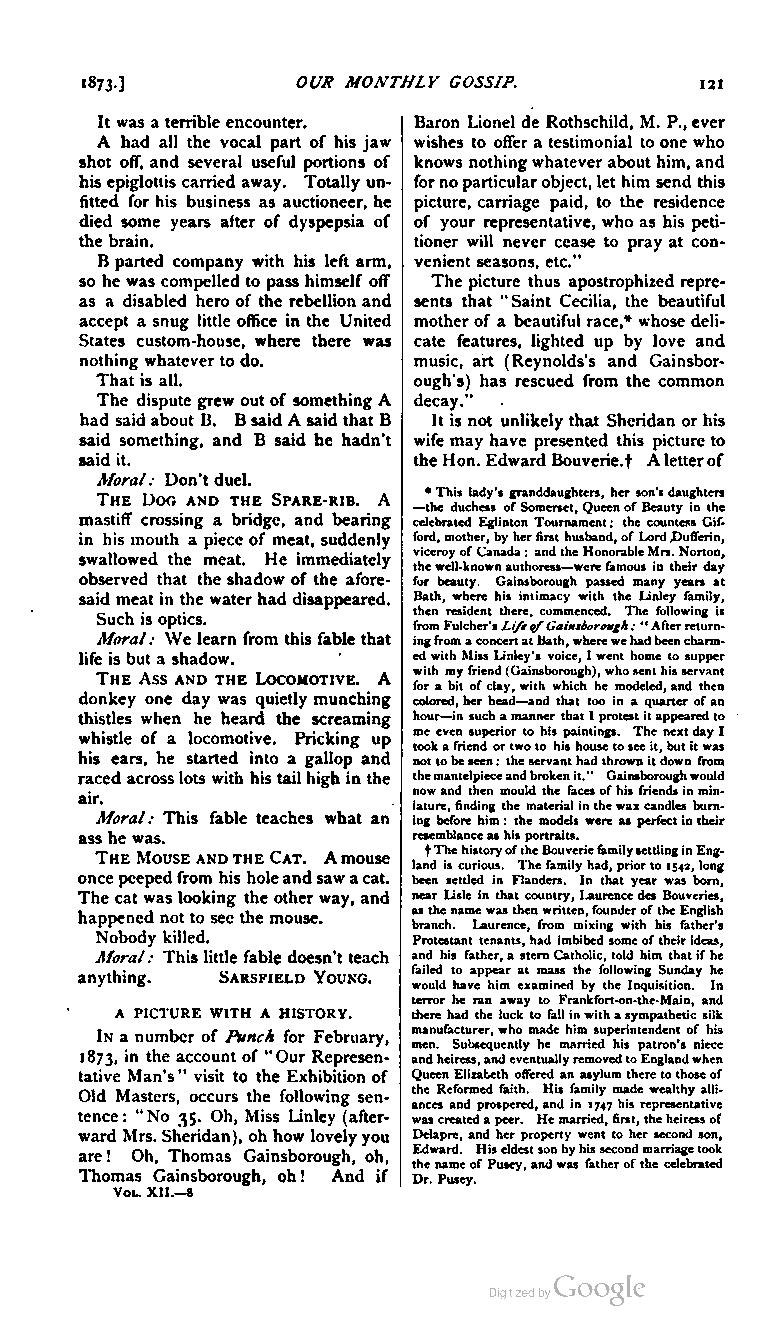It was a terrible encounter.
A had all the vocal part of his jaw shot off, and several useful portions of his epiglottis carried away. Totally unfitted for his business as auctioneer, he died some years after of dyspepsia of the brain.
B parted company with his left arm, so he was compelled to pass himself off as a disabled hero of the rebellion and accept a snug little office in the United States custom-house, where there was nothing whatever to do.
That is all.
The dispute grew out of something A had said about B. B said A said that B said something, and B said he hadn't said it.
Moral: Don't duel.
The Dog and the Spare-rib. A mastiff crossing a bridge, and bearing in his mouth a piece of meat, suddenly swallowed the meat. He immediately observed that the shadow of the aforesaid meat in the water had disappeared.
Such is optics.
Moral: We learn from this fable that life is but a shadow.
The Ass and the Locomotive. A donkey one day was quietly munching thistles when he heard the screaming whistle of a locomotive. Pricking up his ears, he started into a gallop and raced across lots with his tail high in the air.
Moral: This fable teaches what an ass he was.
The Mouse and the Cat. A mouse once peeped from his hole and saw a cat. The cat was looking the other way, and happened not to see the mouse.
Nobody killed.
Moral: This little fable doesn't teach anything. Sarsfield Young.
A PICTURE WITH A HISTORY.
In a number of Punch for February, 1873, in the account of "Our Representative Man's" visit to the Exhibition of Old Masters, occurs the following sentence: "No 35. Oh, Miss Linley (afterward Mrs. Sheridan), oh how lovely you are! Oh, Thomas Gainsborough, oh, Thomas Gainsborough, oh! And if Baron Lionel de Rothschild, M.P., ever wishes to offer a testimonial to one who knows nothing whatever about him, and for no particular object, let him send this picture, carriage paid, to the residence of your representative, who as his petitioner will never cease to pray at convenient seasons, etc."
The picture thus apostrophized represents that "Saint Cecilia, the beautiful mother of a beautiful race,[1] whose delicate features, lighted up by love and music, art (Reynolds's and Gainsborough's) has rescued from the common decay."
It is not unlikely that Sheridan or his wife may have presented this picture to the Hon. Edward Bouverie.[2] A letter of
- ↑ This lady's granddaughters, her son's daughters—the duchess of Somerset, Queen of Beauty in the celebrated Eglinton Tournament; the countess Gifford, mother, by her first husband, of Lord Dufferin, viceroy of Canada; and the Honorable Mrs. Norton, the well-known authoress—were famous in their day for beauty. Gainsborough passed many years at Bath, where his intimacy with the Linley family, then resident there, commenced. The following is from Fulcher's Life of Gainsborough: "After returning from a concert at Bath, where we had been charmed with Miss Linley's voice, I went home to supper with my friend (Gainsborough), who sent his servant for a bit of clay, with which he modeled, and then colored, her head—and that too in a quarter of an hour—in such a manner that I protest it appeared to me even superior to his paintings. The next day I took a friend or two to his house to see it, but it was not to be seen: the servant had thrown it down from the mantelpiece and broken it." Gainsborough would now and then mould the faces of his friends in miniature, finding the material in the wax candles burning before him: the models were as perfect in their resemblance as his portraits.
- ↑ The history of the Bouverie family settling in England is curious. The family had, prior to 1542, long been settled in Flanders. In that year was born, near Lisle in that country, Laurence des Bouveries, as the name was then written, founder of the English branch. Laurence, from mixing with his father's Protestant tenants, had imbibed some of their ideas, and his father, a stern Catholic, told him that if he failed to appear at mass the following Sunday he would have him examined by the Inquisition. In terror he ran away to Frankfort-on-the-Main, and there had the luck to fall in with a sympathetic silk manufacturer, who made him superintendent of his men. Subsequently he married his patron's niece and heiress, and eventually removed to England when Queen Elizabeth offered an asylum there to those of the Reformed faith. His family made wealthy alliances and prospered, and in 1747 his representative was created a peer. He married, first, the heiress of Delapre, and her property went to her second son, Edward. His eldest son by his second marriage took the name of Pusey, and was father of the celebrated Dr. Pusey.
